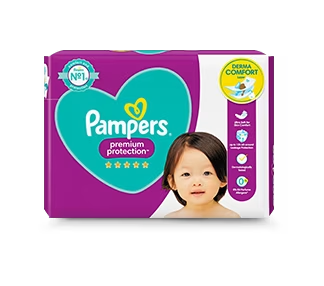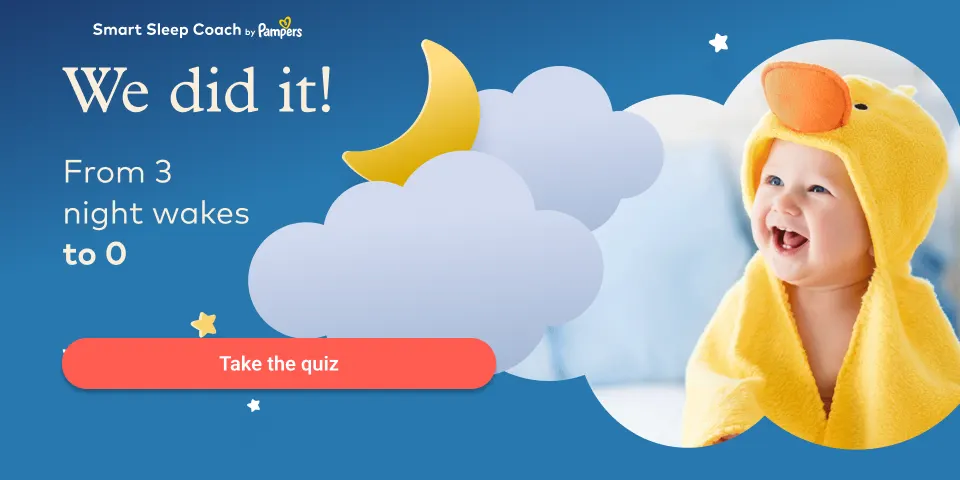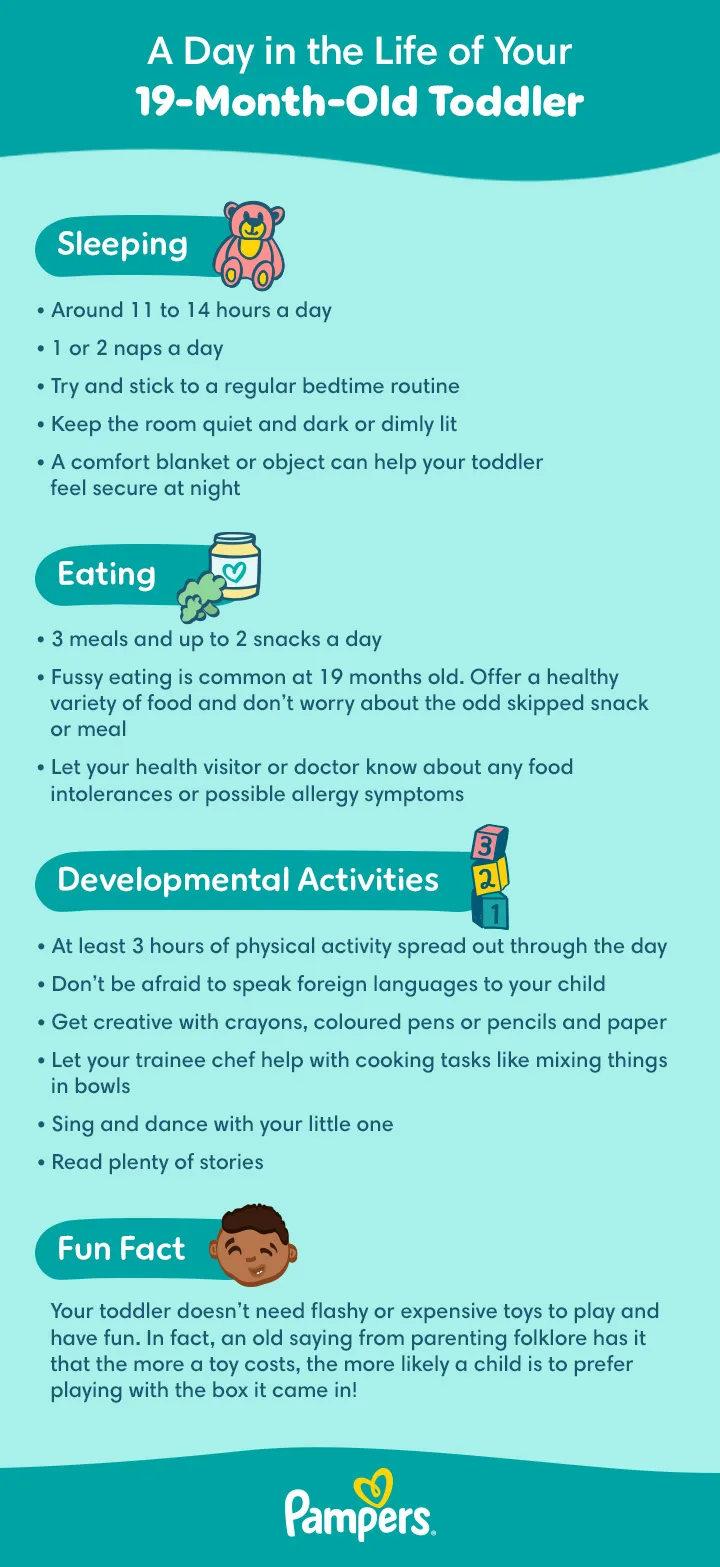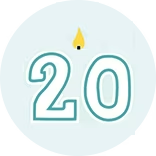19-Month-Old: Chatty and Creative
Your 19-month-old could be more talkative these days as his or her vocabulary keeps growing. And, if your little one is having occasional tantrum at 19 months old, try to keep your cool: These outbursts could be caused by the same desire to express needs and feelings that is driving your child’s language development.
Scroll down to learn more about the milestones your toddler could reach around this month, and to get some tips and activity ideas that help support your 19-month-old’s development.
Toddler Development Milestones
You’ve probably already noticed that your 19-month-old toddler reaches some development milestones a little earlier or later than others. This is perfectly normal. Each child is unique and learns at his or her own pace. The following are just some examples of what your toddler might be getting up to at around 19 months old:
Speech and Language: Getting Chattier.
Your 19-month-old toddler may be able to say simple words for familiar things. These could include the names of people in your family, as well as favourite toys and other common objects. As your child gains independence and starts testing boundaries, you’ll also probably notice that the words ‘no’ and ‘mine’ will start to figure prominently in his or her vocabulary.
At first you might be the only one who understands some of your toddler’s made-up words, but your child will soon learn to say a growing number of words correctly – especially if you respond to mispronounced words with patient, positive reinforcement. For example: ‘That’s right! It’s an elephant!’
Don’t worry if your 19-month-old is not talking as much as you’d expected by this time. Your toddler will get there in the end and already understands many more words than he or she can say.
For example, you might find that your child can follow simple instructions like ‘bring your teddy’ or ‘get your shoes’. You toddler may also be able to point to things if you ask where they are. For example, ‘where’s your nose?’
Movement: Balance and Poise
Your toddler’s balance is improving all the time. Balance is essential for some of the skills that your child will be learning around now or in the weeks and months ahead. These include:
Standing on tiptoes
Walking while carrying things
Running
Kicking a ball
Climbing up and down furniture or playground equipment without help
Walking up and down stairs while holding onto someone’s hand or the bannister (always under your close supervision)
Pulling a toy along while walking.
Hand and Finger Skills: Self-Feeding and More
By now there’s a good chance your child knows how to put a small spoon in his or her mouth the right way up. Learning to self-feed is one of many good ways your toddler could be using those improving hand and finger skills at around 19 months old.
You could try linking this new-found dexterity to other activities that you and your 19-month-old enjoy together. For example, if you read your toddler a story, encourage him or her to turn the pages for you.
Emotional Development: Tantrums
At around 19 months old your child is approaching the stage of toddlerhood sometimes called the terrible twos, so you may already have experienced the odd temper tantrum.
One reason for your toddler’s outbursts can be frustration when your 19-month-old feels unable to express him or herself in words. Try finding out what’s behind the tantrum. If your child is just tired or hungry or in need of a little TLC, a cuddle, a nap or a snack could be all that’s needed to restore order to the universe.
If not, distracting your toddler or just waiting for it to blow over can also help. If the tantrum is because your child doesn’t want to follow an instruction or wants something that’s not allowed, don’t give in and change your mind – however tempting this might seem – it can teach your child that having a tantrum works!
It can be hard to stay patient when faced with toddler tantrums, but it’s important not to lash out or resort to smacking your child, even if he or she starts kicking or biting. It may help to hold your little one gently but firmly until he or she calms down a little.
How to Support Your Toddler’s Development
Here are some activities and other ways of supporting your 19-month-old’s development at home:
If you speak a foreign language, use it. If your family is bilingual, encourage everyone in your family – yourself included – to speak to your toddler in the language they feel the most comfortable with. You'll help forge a connection to these cultures (and other members of your extended family) as well as boosting learning skills. Don’t worry if your child mixes both languages, he or she will eventually know to separate them. When your toddler adds an English word when speaking your language, you can help this process by repeating the sentence in your own language if possible. There’s no need to correct your child or force him or her to use a certain language though.
Get the artistic juices flowing. Around this time, your toddler may find an interest in scribbling – whether it’s on paper or maybe even on other things! Encourage your child’s creativity by providing markers, crayons or coloured pencils and lots of paper or a blackboard/whiteboard to fill up with artwork. It may be a good idea to keep the art supplies tucked away when not in use though, to lower the chances of your budding street artist ‘redecorating’ your home with some creative wall art.
Get cooking. Let your tiny chef help you out with some real cooking that you’re doing. For example, if you’re baking a cake let your toddler help break eggs into a bowl or stir some of the ingredients into the mixture. Two-handed activities like this are great for developing your child’s coordination and fine motor skills. Always supervise your toddler closely in the kitchen and don’t let him or her near anything hot, sharp or otherwise dangerous.
Dance and sing together. Take every opportunity to combine music and movement. For example, make up a little song when you’re dressing your toddler, or play some music for an impromptu dance party. These moments can help you bond with your child and boost his or her development.
Read and reread. Does your 19-month-old have a favourite book that he or she wants to hear again and again? This is your toddler’s busy brain at work, so go ahead and keep reading it. Ask questions about the story or the pictures on the page as you go along, such as ‘Where’s the bear?’ Feel free to add gestures and sound effects, too. Before long, your toddler might be ‘reading’ the words along with you.
Mealtimes for Your 19-Month-Old Toddler
Don’t be surprised if your 19-month-old is picky and refuses to eat certain foods one minute and then turns around and eats everything in sight the next. You might even find your toddler rejects a food that was a firm favourite just a few days ago.
Keep offering three small meals and one or two healthy snacks a day. If your child skips a meal or a healthy snack, that’s OK. Your toddler’s diet will usually balance out over the span of a few days as long as you provide a variety of nutritious foods to choose from.
Let your little one pick what and how much to eat, and if a food is rejected don’t worry – just try offering it again a few days or weeks later.
Supervise your child at mealtimes and only feed your toddler when he or she is sitting down, to minimise the risk of choking.
Watch Out for Food Allergies
As your child tries all kinds of new foods, you may concerned about a food allergy developing, especially if allergies run in your family.
If your child has had eczema as a baby, there’s also a higher chance of your toddler developing some kind of food allergy.
The good news is that kids often grow out of some (but not all) common food allergies, and food allergies only affect 8 percent of children or less. Still, it’s important to introduce new foods one at a time so you can tell what food your toddler is allergic to should you see an allergic reaction.
Here are some possible signs of an allergic reaction to a food (these usually appear within a few seconds or minutes):
Diarrhoea or vomiting
Itchy skin or a rash
Stuffy or runny nose
Red, itchy or sore eyes
Itchy tongue or throat
Shortness of breath or wheezing
Swollen mouth or throat.
Any type of food can cause an allergy, but some more likely culprits include:
Cow’s milk (including milk used in cooking or mixed in with food)
Eggs
Peanuts and tree nuts (such as walnuts, almonds or pistachio)
Soya
Fish and shellfish.
Sometimes children don't have a true food allergy but instead have a food intolerance or food sensitivity. A food intolerance is never life threatening but it can be uncomfortable or distressing.
The symptoms usually come on gradually, sometimes several hours after eating the food, and include bloating, tummy ache, wind and/or loose stools or diarrhoea.
When to See the Doctor
Let your doctor or health visitor know if you suspect your toddler has a food allergy or intolerance.
Allergic reactions to food are often mild, but in severe cases they can be dangerous. Seek urgent medical attention if your child shows the symptoms of a severe allergic reaction, such as:
Trouble breathing
Wheezing
Rapid heartbeat
Clammy skin
Seeming confused
Fainting, collapsing or losing consciousness.
How Much Sleep Does a 19-Month-Old Toddler Need?
At 19 months old, your toddler needs about 11 to 14 hours of sleep per day, which typically includes at least 1 nap.
If your toddler is having some sleep problems such as resisting going to bed or waking during the night, it might help to review your bedtime routine or nap schedule.
Tips for Better Quality Sleep
These ideas might help your toddler sleep a little better:
Aim for your toddler go to bed at the same time every night
Have a bedtime routine that starts about half an hour before bedtime. This might include a bath, a soothing massage, a comforting cuddle, a bedtime story, a lullaby or just recounting all the things you’ve done together that day.
Let your toddler have a security object, like a favourite cuddly toy or blanket to snuggle up to in bed. This can help with night awakenings, as the familiar object can provide a sense of security when you’re not in the room or close to your toddler’s cot or bed.
Make sure your child’s bedroom is quiet and at a comfortable temperature for sleeping. As a general rule, the room should be dark, although your child may find it comforting to have a night-light on.
Put your toddler to bed when he or she is drowsy but still awake
If sleep problems persist or you notice any sleep regression in your 19-month-old (when sleeping patterns seem to suffer a setback), try some of these sleep training techniques or ask your health visitor or doctor for advice.
A Day in the Life of Your Toddler
Wondering what a typical day might look like with a toddler? No two days will ever be the same, but here’s a quick look at what a day might look like:
Your Toddler’s Health: Staying Physically Active
Whether it takes the form of exploring the nooks and crannies of your home, running around or throwing a ball, physical activity is important for your toddler’s healthy growth and development.
Experts recommend that at 19 months old your little one get at least 180 minutes (3 hours) of physical activity every day. If that sounds a little hectic, don’t worry: That figure includes light activities like standing up, moving around and playing, as well as more energetic pursuits such as running and jumping.
Each of your child’s movements, small and large, is a step towards developing better coordination, muscle control, balance and much more. Encourage your toddler to stay active by being an active participant in his or her play.
Ideally, some of the daily activity should be outdoors. Using climbing frames and swings, playing chasing games and ball games, or riding a balance bike, push-along trike or three-wheeled scooter are all great outdoor pursuits that your toddler might enjoy.
For rainy days, some of these indoor games for toddlers might be able to get your 19-month-old moving.
FAQs at a Glance
All children develop at their own pace, but at around 19 months old your toddler may be able to:
• Walk without support or assistance
• Go upstairs holding your hand
• Stack blocks
• Turn the page of a book
• Use a spoon to eat.
Your Life as a Parent: ‘Me Time’ and Support Networks
Life can be busy and chaotic when you're raising a 19-month-old. To help cope with everything that comes your way, it’s important to look after yourself, too.
Taking care of a toddler takes a lot of energy and can quickly tire you out. You’ll know when you’re tired, and so will your toddler. In these moments, it’s OK to ask your partner, a family member or babysitter to take over for an hour or two. A little ‘me time’ to do something just for you will give you the chance to recharge your batteries.
To prevent feeling isolated, you could join parent and child groups in your local area. Some might just be for socialising and networking with mums from your neighbourhood, while others could offer support for parents in specific situations, for example single parents, parents from a similar background and culture or the parents of children with certain disabilities or health issues.
Creating a network of supportive parents means you’ll have someone to talk to who’s in a similar situation to yours, and this may help relieve some of the stress, anxiety or loneliness you might be feeling as you juggle all of parenting’s ups and downs.
Go online and/or ask your health visitor or doctor for information about what’s available where you live.
Checklist for This Month
Learn some songs and their actions. Action songs like ‘The Wheels on the Bus’ and ‘Heads and Shoulders, Knees and Toes’ are great for developing all sorts of skills, from listening, understanding and talking to balance and coordination. Your 19-month-old will love chanting and singing along with you.
Check that your toddler’s toys are safe. Make sure that none are broken, have missing parts or sharp edges, or are cracked or chipped. It’s best to throw away any toys that are no longer safe. Be careful to dispose of any electronic components or spent batteries responsibly.
Think about switching to a toddler bed. If your toddler is nearly able to climb out of his or her cot even with the mattress at the lowest possible setting, it might be time to make the switch to a ‘proper’ child’s bed. If your child’s cot is convertible, dig out the instructions and convert it to a low bed. Otherwise, it might be time to buy a child’s bed that is safe and practical for your little one.
Consider getting a lightweight stroller. If you find you’re traveling more and more with your toddler, you might consider getting a lightweight or umbrella-fold pushchair. These are much more portable than a standard pushchair or travel system. They take up less space in the boot of your car and, when folded, are easy to stow away by your table in a restaurant. Also, they can often be slung effortlessly over a shoulder if you need to hop on a bus or tram with both hands free to guide and keep hold of your adventurous little explorer. It’s something to think about for when you’re out and about with your toddler.
To get more insights and information like this, sign up for regular emails:
19 month old baby - checklist





